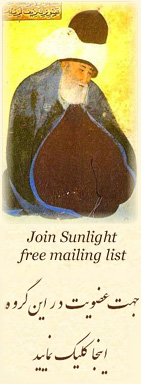version from the Helminskis (assumed to be derived from Nicholson, an
assumption which is based on translation peculiarities and errors
which Helminski has apparently carried over from Nicholson, in
various poems), and in a translation from Professor Nicholson,
accompanied by a transliteration from Dr. Gamard:
^ ^ ^ ^ ^
Hope is the deaf man who has often heard of our dying,
but hasn't heard of his own death or contemplated his own end.
The blind man is Greed: he sees the faults of others,
hair by hair, and broadcasts them from street to street,
but of his own faults his blind eyes perceive nothing.
The naked man fears his cloak will be pulled off,
but how could anyone take the cloak of one who is naked?
The worldly man is destitute and terrified:
he possesses nothing, yet he dreads thieves.
When death comes, everyone around him is lamenting,
while his own spirit begins to laugh at his fear.
At that moment the rich man knows he has no gold,
and the keen-witted man sees that talent does not belong to him.
-- Mathnawi III:2628-2635
Version by Camille and Kabir Helminski
"Rumi: Jewels of Remembrance"
Threshold Books, 1996
~ ~ ~ ~ ~ ~ ~ ~ ~ ~ ~ ~ ~ ~
Know that hope is the deaf man who has (often) heard of our dying,
(but) has not heard of his own death or regarded his own decease.
The blind man is Greed: he sees other people's faults, hair by hair,
and tells them from street to street,
(But) his blind eyes do not perceive one mote of his own faults,
albeit he is a fault-finder.
The naked man is afraid that his skirt will be cut off: how should
they (anyone) cut off the skirt of a naked man?
The worldly man is destitute and terrified: he possesses nothing,
(yet) he has dread of thieves.
Bare he came and naked he goes, and (all the while) his heart is
bleeding with anxiety on account of the thief.
At the hour of death when a hundred lamentations are (being made)
beside him, his spirit begins to laugh at its own fear.
At that moment, the rich man knows that he has no gold; the
keen-witted man, too, knows that he is devoid of talent.
('Tis) like (as when) a child's lap (is) filled with potsherds, for he
(the child) is trembling for them, like the owner of riches.
If you take a piece away, he begins to weep; and if you give the piece
back to him, he begins to laugh.
....
This, this, is the soul of all the sciences -- that thou shouldst know
who thou shalt be on the Day of Judgment.
-- Mathnawi III, 2628-2637, 2654
Translation and Commentary by Reynold A. Nicholson
Published and Distributed by The Trustees of
The "E.J.W. Gibb Memorial"
~ ~ ~ ~ ~ ~ ~ ~ ~ ~ ~ ~ ~ ~
kar amal-râ dân ke marg-é mâ shenîd
marg-é khwad na-sh'nîd-o naql -é khwad na-dîd
hirs nâ-bînâ-st bîn-ad mô ba mô
`ayb-ê khalq-ân-o be-gôy-ad kô ba kô
`ayb-é khwad yak zarra chashm-é kûr-é ô
mê-na-bîn-ad gar-cha hast ô `ayb-jô
`ûr mê-tars-ad ke dâmân-ash bor-and
dâman-é mard-é barahna chûn dar-and?
mard-é dunyâ muflis-ast-o tars-nâk
hêch ô-râ nêst az dozdân-ash bâk
ô barahna âm-ad-o `uryân raw-ad
w-az gham-é dozd-ash jegar khûn mê-shaw-ad
waqt-é marg-ash ke bow-ad sad nawha bêsh
khanda ây-ad jân'sh-râ z-în tars-é khwêsh
ân zamân dân-ad ghanî ke-sh nêst zar
ham zakî dân-ad ke ô bod bê-honar
chûn kenâr-é kôdakê por az sufâl
k-ô bar ân larzân bow-ad chûn rabb-é mâl
gar setân-î pârayê geryân shaw-ad
pâra gar bâz-ash deh-î khandân shaw-ad
....
jân jomla `ilm-hâ în-ast în
ke be-dân-î man ke-y-am dar Yawm-é Dîn
-- Mathnawi III: 2628-2637, 2654
(Persian transliteration courtesy of Dr. Ibrâhîm Gamard)
The media:
http://img.photojerk.com/mzK2AINF.jpg
^ ^ ^ ^ ^







No comments:
Post a Comment